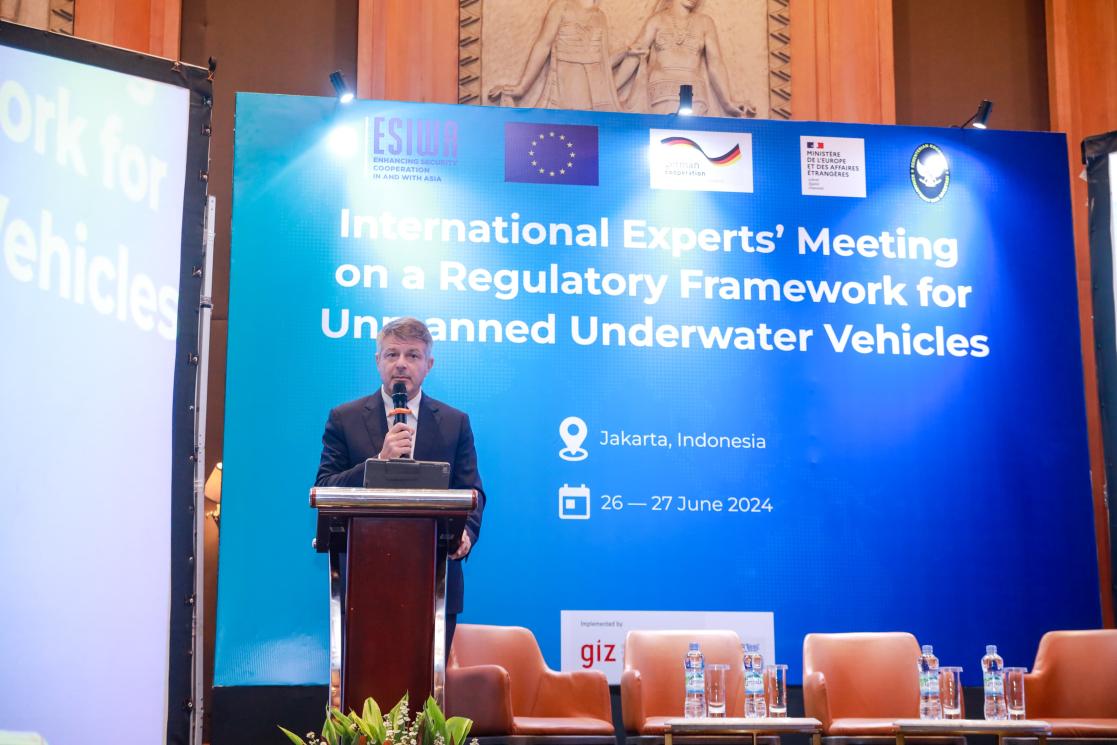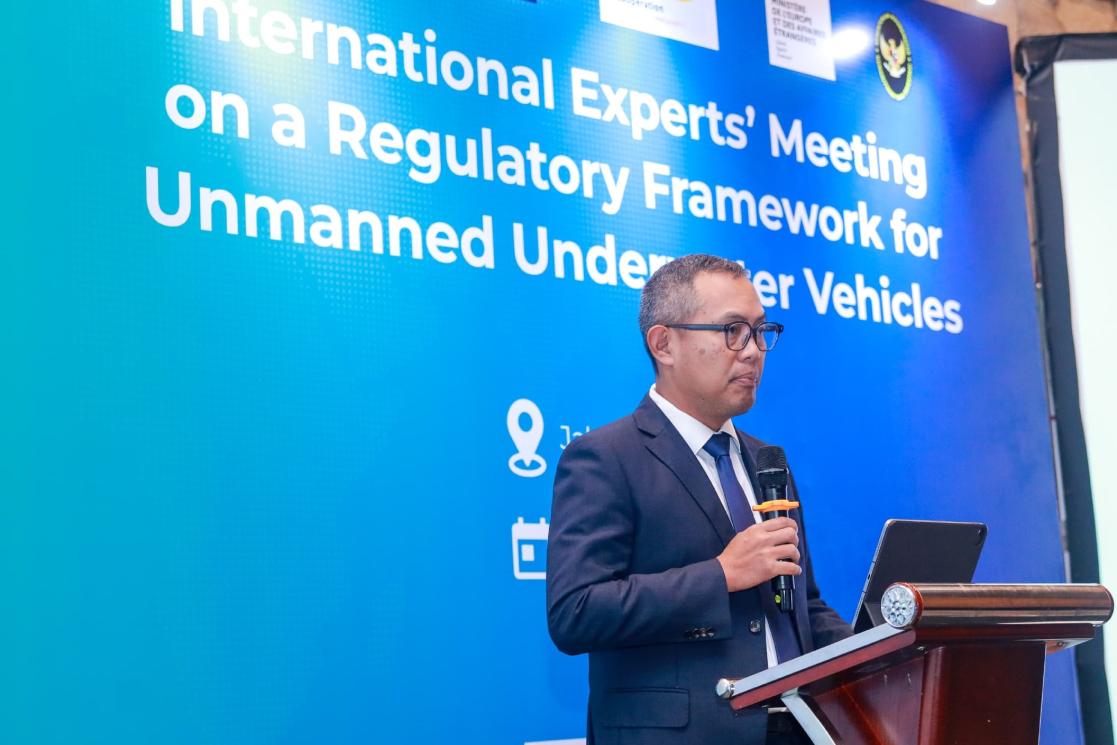EU, Indonesia exchange experiences and explore steps to regulate underwater drones

Download the press release in PDF format:
EU, Indonesia exchange experiences and explore steps to regulate underwater drones
- EU-Indonesia international experts’ meeting in Jakarta is underway with sharing experiences and exploring steps to advance the regulatory framework for unmanned underwater vehicles (UUVs).
- Participants from the European Union, EU Member States, Indonesia and Japan expressed strong commitment to further strengthening maritime security.
Jakarta, 26 June, 2024 - In a significant step towards ensuring the responsible and sustainable use of underwater drones, participants from Indonesia and the European Union (EU) convened at the International Experts’ Meeting on the Regulatory Framework for Unmanned Underwater Vehicles (UUVs).
The activity brought together leading professionals from government, industry and academia to address the pressing need for a comprehensive regulatory framework that balances innovation with regulation.
The growing availability and widespread use of UUVs has increased underwater drone activity around the world, including in Indonesia, the world’s largest archipelagic country with rich marine biodiversity. Current rules necessitate UUV permits and licenses in only a few situations.
The two-day meeting is underway with participants exchanging experiences and exploring actionable steps to advance the regulatory framework for UUVs. The event was co-organised by the Republic of Indonesia’s Coordinating Ministry of Maritime Affairs and Investment (Kemenko Marves) and the European Union, with the support of the EU project "Enhancing Security In and With Asia" (ESIWA).
Denis Chaibi, EU Ambassador to Indonesia, said: “The market size of Unmanned Underwater Vehicles or UUVs is estimated to grow at between 12 and 20% per year, and is likely to have doubled by the end of this decade. Yet, there is not much debate about the classification of these crafts, and how they fit within the existing ocean governance. The European Union and its Member States, working as a ‘Team Europe’, have some technological expertise, and Indonesia, as the world’s largest archipelagic state, has experience and insight. Their joint reflection can be a significant and positive contribution in maintaining a rules-based approach for the Oceans, and for the International Maritime Organisation’s (IMO) work in this field.”
Jodi Mahardi, Deputy Coordinating Minister for Maritime Sovereignty and Energy, Coordinating Ministry for Maritime Affairs and Investment, Republic of Indonesia, said: “I am confident that the International Experts’ Meeting on Unmanned Underwater Vehicles will provide a valuable platform for us to engage in purposeful discussions on Maritime Domain Awareness and maritime security best practices.”
“Our reliance on the security and sustainability of our waters is based on openness and connectivity, and it is essential to promote and maintain the safety, security, and peacefulness of our maritime environment,” Mahardi added.
During the meeting, participants from the EU, Indonesia and Japan expressed strong commitment to further strengthening maritime security.
In-depth discussions focussed on critical aspects of UUV regulation, including:
- Safety and Standards: Emphasis was placed on developing rigorous safety standards and protocols to ensure the reliable and secure operation of UUVs;
- Environmental Protection: The need to minimize the environmental impact of UUV operations was highlighted, with guidelines proposed to protect sensitive marine ecosystems and biodiversity;
- Security and Privacy: Clear international agreements were deemed necessary to balance security needs with respect for sovereignty and privacy, alongside protocols for data protection and ethical use of surveillance technologies;
- Legal and Ethical Considerations: The meeting underscored the importance of clarifying the legal frameworks governing UUV use in international waters and addressing the ethical implications of their deployment in culturally significant areas; and
- Collaboration and Innovation: Participants called for increased international collaboration and the fostering of partnerships across sectors to share knowledge and best practices, and to encourage innovation within a structured regulatory framework.
# # #

ESIWA

ESIWA

ESIWA

ESIWA
About ESIWA
The ESIWA project works to enhance the EU’s security and defence cooperation with the Indo-Pacific in four thematic areas: counterterrorism and preventing violent extremism, crisis management, cyber security and maritime security. The project is co-funded by the European Union, the German Federal Foreign Office, and the French Ministry for Europe and Foreign Affairs. ESIWA is co-implemented by the German Corporation for International Cooperation (GIZ) & Expertise France.
ESIWA’s activities in maritime security aim to promote a fair, transparent, rules-based maritime order, and strengthen maritime responses to security challenges.
Previous ESIWA activities in Indonesia have covered maritime security, standard minimum rules for the treatment of children, application of international law to cyberspace, UN norms on responsible state behaviour, good practice to respond to cybercrime, anti-money laundering and countering terrorism financing, crisis management, connecting women working in counterterrorism law enforcement, Common Security and Defence Policy (CSDP) handbook book tours, support to the development of Indonesia's Knowledge Hub on Countering Terrorism and Violent Extremism (#IKHub). From September 2020, ESIWA began to support the EU Delegation in Jakarta and the implementation of the EU Activity Plan.
CONTACT DETAILS
Rahul Venkit
Communications & Visibility Expert
Enhancing the EU’s Security Cooperation In and With Asia (ESIWA) project
